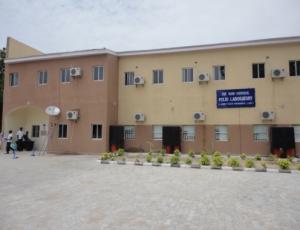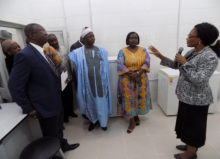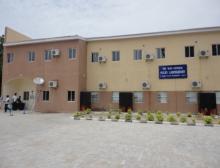Nigeria commissions WHO-accredited National Polio laboratory in Maiduguri, Borno State
Maiduguri, 15 July, 2016 - A WHO-accredited Polio laboratory with the capacity to handle 15,000 stool samples per year within the polio eradication initiative from 10 states in the north of the country has been commissioned at the University of Maiduguri Teaching hospital (UMTH) on 14 July, 2016.
Speaking at the commissioning of the laboratory, the Chief Medical Director of UMTH, represented by Professor Haruna Yusuf, expressed immense gratitude to WHO for making the renovation of the polio laboratory possible, for its contributions to the establishment of the infectious diseases unit and for building the capacity of hospital staff over the years.
He assured WHO that the management of the UMTH will continue to support the laboratory in the pursuit of its objectives towards polio eradication both in Nigeria and Africa as a whole.
Similarly, Dr Fiona Braka, the WHO EPI Team Leader, speaking on behalf of the WHO Country Representative in Nigeria, commended the management of the UMTH for its unflinching support over the years towards ensuring the success of the polio laboratory.
Dr Braka noted the important contribution of the laboratory saying “the history of progress so far recorded cannot be complete without acknowledging the contributions of the polio laboratory”.
She observed that the renovation became necessary so as to provide more workspace for increased needed supplies and personnel owing to the increased workload of the laboratory since 2014. She thanked UMTH for deploying the additional personnel needed over the past two years to handle the increased workload.
Dr Braka also used the opportunity to acknowledge the commitment of the staff and for achieving annual laboratory accreditation over the years despite the challenging security situation.
She noted that “in the context of the polio legacy aimed at transitioning polio assets to benefit broader public health goals, it is hoped that the laboratory will support other disease control initiatives in the future”.
During a guided tour of the renovated laboratory, Professor Marycelin Baba, the Director of the Laboratory, explained that the structure includes a reception room, 10 separate laboratory rooms, 4 staff offices, 1 conference room, two stores and 1 archival room. The laboratory, she added, has the capacity to handle some 15,000 stool samples per year within the polio eradication initiative from 10 states in the north of the country.
WHO also supports a second polio lab in the University College Hospital in Ibadan that handles samples from the remaining 26 states and the Federal Capital Territory.
The event was witnessed by representatives of Rotary International, UNICEF and the Centers for Disease Control and Prevention, as well as WHO staff from the Country Office and Borno state.
__________________________________________
Technical contacts:
Dr Fiona Braka; Tel: +234 703 170 5252; Email: %20brakaf [at] who.inttarget="_blank"
Dr Ticha Johnson; Tel: +234 816 347 5205; Email: tichaj [at] who.int
Media contacts:
Ms Charity Warigon; Tel: +234 810 221 0093; Email: %20warigonc [at] who.inttarget="_blank"
Dr Umar Mustapha; Tel: +234 803 616 9972; Email: umarm [at] who.int
__________________________________________
01 Structure of the commissioned National polio lab
02 (L-R) Professor Yusuf, representative of Rotary International, WHO EPI TL and Lab Director during tour of the lab.






